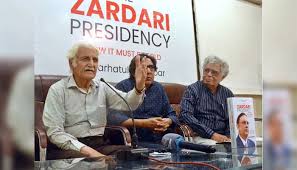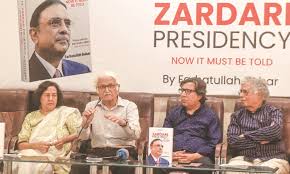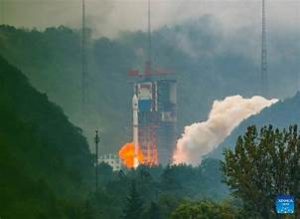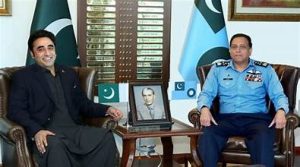“Zardari Presidency—Now It Must Be Told” unveiled in Karachi

Karachi, May 26, 2025: “Zardari Presidency—Now It Must Be Told”—memoirs of former senator and Presidential spokesperson Farhatullah Babar during Zardari’s first presidency (2008-2013) was formally unveiled by Lightstone Publishers managing director Ameena Saiyid Monday afternoon in Karachi press club, also attended by the author..
“It is not a biography of President Zardari but an insider’s first-hand account, never published before, of the most tumultuous, sometimes bordering on bizarre, incidents that shook not only the president personally but the country”, he said on the occasion.
“It Must Be Told’ is an obligation to throw light on the triumphs and the ambushes endured by a civilian elected president of the country and draw appropriate lessons, he said.
The 500-page book has over 80 chapters.
In addition to ‘Zardari As a Person’ the book contains a detailed account of the most cataclysmic events of the time:

-Discovery of Osama Bin Laden in a military cantonment and the army and Intel chiefs moving Chaudhry Court against the supreme commander.
-Mundane goings on just when US Navy Seals were bombing Osama Bin Laden, a red-faced establishment vainly searching for scapegoats to blame, unconvincing claims that CIA was indeed tipped by Pak agencies and outlandish suggestions that the raid was tacitly approval at some higher command level.
-The fight between Justice Chaudhry and Zardari, mediation bid, Zardari yelling ‘enough is enough’ and Chaudhry dismounting the high horse.
-Tense relationship with the establishment breathing down the President’s neck.
-Three services chiefs abstaining from President’s banquet for a foreign dignitary.
-Context and fall out of Prime Minister’s yell in Parliament ‘state within state unacceptable’ and asking ‘who gave Osama Pakistani visa’
-Ambassador Munter’s extraordinary worries to get Raymond Davis out of Pakistan, leaving Zardari rather perplexed.
-A besieged Zardari hitting back at the entrenched establishment in the Memogate scandal, leaving him profusely bleeding, the establishment knawing teeth, and the civil-military disconnect further widened.
-Political manoeuvring to chase Musharraf out of the presidency
‘Revealing for the first time, the draft of the charge sheet to impeach Musharraf.
-The ‘cat and mouse games’ played by the establishment with the civilian and political leadership of the country during Zardari presidency.
-Zardari’s offer of talks to India on no first use of nuclear weapons and its spectacular failure.
-Secret bid for rapprochement between Saudi Arabia and Iran
-Three hours long meeting with Aung Suu Kyi in Naypyida and extraordinary conversation.
-The scene at night when troops thudded in the Presidency to brow beat a defiant president, described thus “In the car park I sat inside the car for some time, trying to figure out what was happening, and drew out my notebook and pen I watched how the troops moved in pairs more closely, strutting around with an air of assumed authority. I began noting it in short hand”.
Farhatullah Babar said that the book is neither ‘Aik Zardari sab par bhari’ nor of Zardari a villain and street smart wheeler dealer as painted by sections of media. Zardari portrayed is as he was—a human being, not a saint or an angel, resilient but going far too far in seeking reconciliation, the broad grin on his face hiding a shrewd and calculating politician adept in the art of keeping cards closest to his vest. It is the portrait of the political leader generous to a fault, a product of power, and also its prisoner.
The memoirs is a window into Zardari presidency—from the perspective of a witness, a participant, and perhaps the lone scribe at the time who maintained a personal diary for the sake of recording history—even while thinking that his stint will not last long.
It is the tale of a president walking on a tightrope and juggling allies, opponents, judges, his party, ghosts, and generals. This is not heresy but an eye witness’ offering to history.
The book begins with a confession: Zardari was seen as an accidental president, unlikely to complete his five year term.
Farhatullah Babar writes that he also believed that Zardari would not survive as president for long, and even if he did, he himself would not survive as Spokesperson for long. He did not print visiting cards as ‘Spokesperson to President’ thinking that each day might be the last. He acknowledges that Zardari proved him and many others wrong.
Zardari has been sinned against far more than sinning, he says.
“In the final analysis, the life of Zardari, painted as a villain, brings to mind Dostoevsky’s famous novel ‘Crime and Punishment’. In it, the central character, Raskolnikov, believed that the woman named Sonya was a sinner. Upon discovering the truth about her—that Sonya was not a sinner—he leapt towards her, kissed her feet, and asked for forgiveness. In that profound encounter, Raskolnikov acts as if he “worshipped the triumph of human endurance, and the strength of the human spirit, which could withstand so much and bear so much.”
“Those who, in the words of General Musharraf, have played ‘Cat and Mouse’ have lost their game to human endurance. Even if they have not yet sought forgiveness, Zardari couldn’t have asked for more. He had the last laugh”.
Farhatullah Babar said that he had not sought permission for this work from Mr. Zardari or from the PPP.





